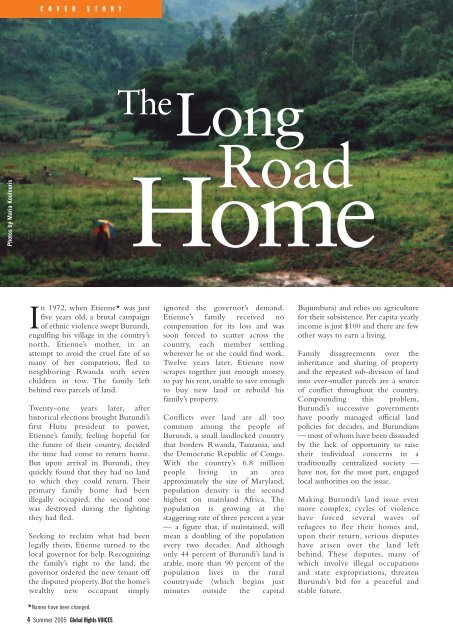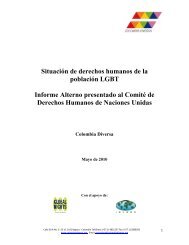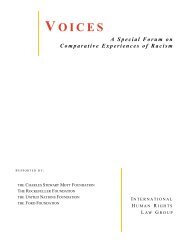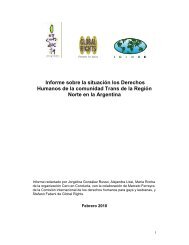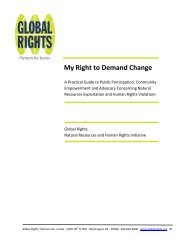The Long Road Home - Global Rights
The Long Road Home - Global Rights
The Long Road Home - Global Rights
Create successful ePaper yourself
Turn your PDF publications into a flip-book with our unique Google optimized e-Paper software.
Photos by Maria Koulouris<br />
C O V E R S T O R Y<br />
4 Summer 2005 <strong>Global</strong> <strong>Rights</strong> VOICES<br />
<strong>The</strong><br />
In 1972, when Etienne* was just<br />
five years old, a brutal campaign<br />
of ethnic violence swept Burundi,<br />
engulfing his village in the country’s<br />
north. Etienne’s mother, in an<br />
attempt to avoid the cruel fate of so<br />
many of her compatriots, fled to<br />
neighboring Rwanda with seven<br />
children in tow. <strong>The</strong> family left<br />
behind two parcels of land.<br />
Twenty-one years later, after<br />
historical elections brought Burundi’s<br />
first Hutu president to power,<br />
Etienne’s family, feeling hopeful for<br />
the future of their country, decided<br />
the time had come to return home.<br />
But upon arrival in Burundi, they<br />
quickly found that they had no land<br />
to which they could return. <strong>The</strong>ir<br />
primary family home had been<br />
illegally occupied, the second one<br />
was destroyed during the fighting<br />
they had fled.<br />
Seeking to reclaim what had been<br />
legally theirs, Etienne turned to the<br />
local governor for help. Recognizing<br />
the family’s right to the land, the<br />
governor ordered the new tenant off<br />
the disputed property. But the home’s<br />
wealthy new occupant simply<br />
*Names have been changed.<br />
<strong>Long</strong><br />
<strong>Road</strong><br />
<strong>Home</strong><br />
ignored the governor’s demand.<br />
Etienne’s family received no<br />
compensation for its loss and was<br />
soon forced to scatter across the<br />
country, each member settling<br />
wherever he or she could find work.<br />
Twelve years later, Etienne now<br />
scrapes together just enough money<br />
to pay his rent, unable to save enough<br />
to buy new land or rebuild his<br />
family’s property.<br />
Conflicts over land are all too<br />
common among the people of<br />
Burundi, a small landlocked country<br />
that borders Rwanda, Tanzania, and<br />
the Democratic Republic of Congo.<br />
With the country’s 6.8 million<br />
people living in an area<br />
approximately the size of Maryland,<br />
population density is the second<br />
highest on mainland Africa. <strong>The</strong><br />
population is growing at the<br />
staggering rate of three percent a year<br />
— a figure that, if maintained, will<br />
mean a doubling of the population<br />
every two decades. And although<br />
only 44 percent of Burundi’s land is<br />
arable, more than 90 percent of the<br />
population lives in the rural<br />
countryside (which begins just<br />
minutes outside the capital<br />
Bujumbura) and relies on agriculture<br />
for their subsistence. Per capita yearly<br />
income is just $100 and there are few<br />
other ways to earn a living.<br />
Family disagreements over the<br />
inheritance and sharing of property<br />
and the repeated sub-division of land<br />
into ever-smaller parcels are a source<br />
of conflict throughout the country.<br />
Compounding this problem,<br />
Burundi’s successive governments<br />
have poorly managed official land<br />
policies for decades, and Burundians<br />
— most of whom have been dissuaded<br />
by the lack of opportunity to raise<br />
their individual concerns in a<br />
traditionally centralized society —<br />
have not, for the most part, engaged<br />
local authorities on the issue.<br />
Making Burundi’s land issue even<br />
more complex, cycles of violence<br />
have forced several waves of<br />
refugees to flee their homes and,<br />
upon their return, serious disputes<br />
have arisen over the land left<br />
behind. <strong>The</strong>se disputes, many of<br />
which involve illegal occupations<br />
and state expropriations, threaten<br />
Burundi’s bid for a peaceful and<br />
stable future.


